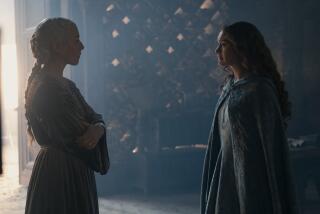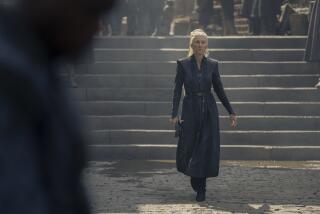Review: Ridley Scottâs epic âThe Last Duelâ rebukes the patriarchy in every era
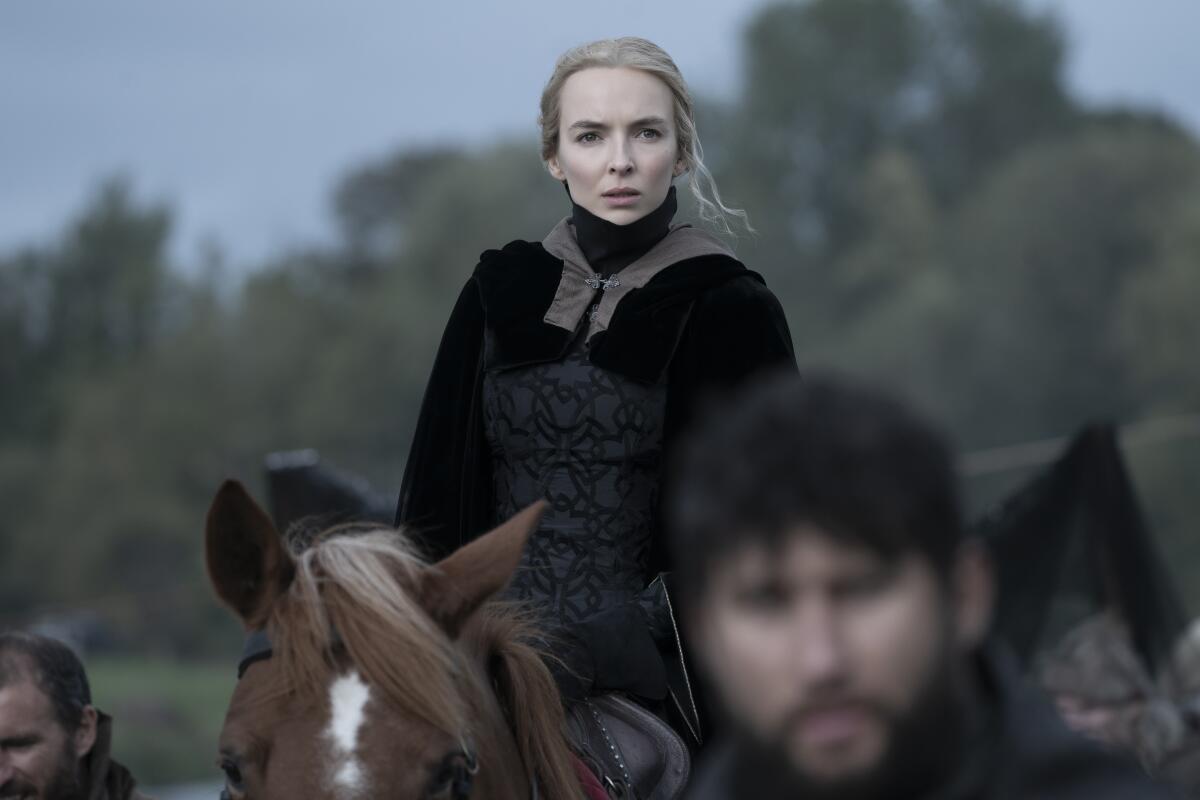
The Times is committed to reviewing theatrical film releases during the COVID-19 pandemic. Because moviegoing carries risks during this time, we remind readers to follow health and safety guidelines as outlined by the Centers for Disease Control and Prevention and local health officials.
Toward the end of Ridley Scottâs âThe Last Duel,â an epic evisceration of bad men and worse hair, a court official argues that a woman must experience sexual pleasure in order to conceive a child. âA rape,â he concludes, âcannot cause a pregnancy.â Thatâs your cue to scoff at the dire intellects of 14th century France, but it may also remind you of some of the comparably idiotic things that male politicians have uttered in our ostensibly more enlightened times. I doubt Iâll be the only viewer to flash back on the career-ending words of the former Missouri congressman Todd Akin, who in 2012 declared that the female body has ways of shutting down pregnancies in cases of âlegitimate rape.â
Those words resurfaced in the wake of Akinâs death earlier this month, a circumstance that the screenwriters â Matt Damon, Ben Affleck and Nicole Holofcener â could hardly have foreseen. Nonetheless, their canny grasp of the political continuities between past and present is one of their scriptâs more pointed surprises. And surprises are key here: A bloody medieval drama hinging on a sexual assault case, after all, is hardly what anyone might have expected from Damon and Affleck, reteaming on the page for the first time since their Oscar-winning script for âGood Will Hunting,â or from Holofcener, known for her sharp contemporary comedies like âPlease Giveâ and âEnough Said.â A willingness to subvert expectations is one reason this ungainly, ingenious and altogether fascinating collaboration works as well as it does.
Adapted from Eric Jagerâs 2004 book, âThe Last Duelâ is a sprawling, often darkly funny account of the rivalry between two Normandy-born frenemies â Sir Jean de Carrouges (Damon), a knight, and Jacques Le Gris (Adam Driver), a squire â and the rape accusation brought against Le Gris by Carrougesâ wife, Marguerite (Jodie Comer). That charge led Carrouges and Le Gris to their bloody final reckoning, the last trial by combat ever officially recognized in France. The movie opens with the duel about to get underway on a December morning in Paris in 1386 â a prologue that finds Scott in fine action-movie fettle, with enough clomping of hooves and clashing of weapons to stir memories of âGladiatorâ and âKingdom of Heaven,â to say nothing of âThe Duellists,â his excellent 1977 debut.
But the movie to which this one bears the most significant resemblance is of even older vintage. It would be hard at this point to overstate the cultural cachet of âRashomon,â an inspiration for countless movies about the elusive nature of truth (plus one of the greatest âSimpsonsâ jokes ever written). Its influence here is obvious: After that thunderous opening, âThe Last Duelâ abruptly cuts away, rewinds several years and proceeds to unravel its story in three distinct chapters, each one playing the same events from a different characterâs perspective. Affleck and Damon wrote the male-centric first two chapters; Holofcener wrote the third, which adopts Margueriteâs point of view.
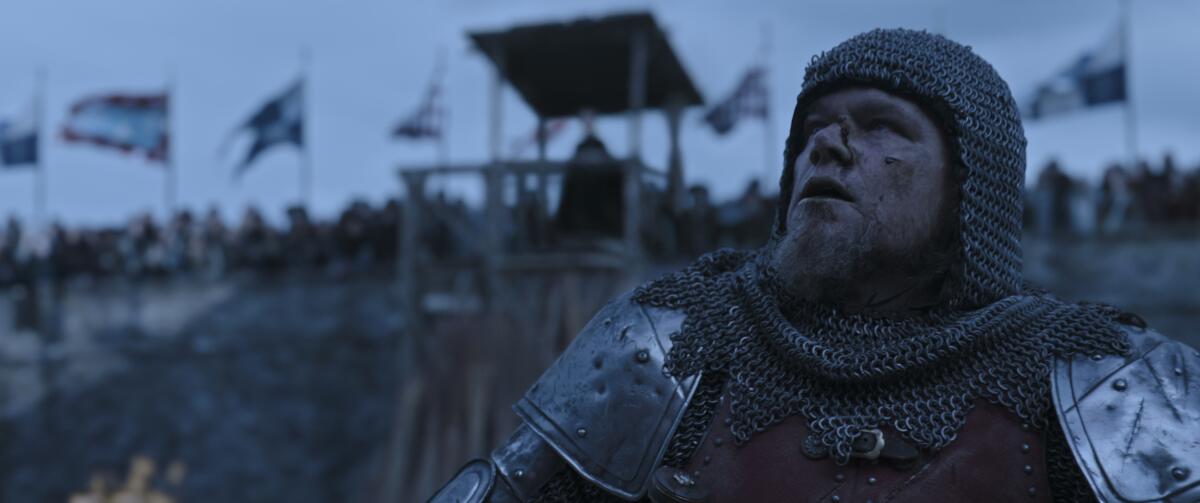
First up is Carrouges, played by Damon with a battle-scarred cheek, a righteous scowl and a mullet so hideous it turns you against him almost immediately, even in his own story. And itâs worth unpacking the hair in this movie, by the way, which is as revealing as the dripping candle wax of Arthur Maxâs production design and the muted richness of Janty Yatesâ costumes. The mere sight of Damonâs unkempt scraggle tells you everything you need to know about what a tool Carrouges is; the spectacle of Driver, sporting the long, dark tresses you might find on the cover of a medieval bodice-ripper, announces Le Gris as the life of the party.
No tonsorial slouch himself is their overlord, Count Pierre dâAlençon, a saucy libertine (hilariously played by a peroxide-blond Affleck) who makes no secret of his preference for Le Gris over Carrouges. (The mutual loathing between Affleckâs and Damonâs characters is one of the movieâs slyer jokes.) As the lowly squire begins to rise above the noble-born knight, their once-close friendship, forged years earlier in the thick of battle, swiftly disintegrates. Land and title disputes follow, as do some halfhearted attempts at reconciliation. Complicated dynamics of class, power and real estate are parsed, often in winkingly anachronistic language (âIâm broke!â the count declares at one point). But once Carrouges marries Marguerite, whose beauty catches Le Grisâ ever-watchful eye, all three characters are clearly destined for a tragic collision.
The first chapter exaggerates Carrougesâ righteousness; the second chapter flatters Le Grisâ ego. Enormously popular with the women he beds each night in Count Pierreâs party-hearty boudoir, Le Gris has no trouble believing that, once heâs fallen in love with Marguerite, she must naturally reciprocate his feelings. And so when he enters her home and forces himself on her while Carrouges is absent, he dismisses her anguished protests as merely the passionate outcries of a guilty conscience. The audience will suffer no such delusion: Even in a rendering of events that favors Le Grisâ perspective, itâs impossible to read this scene as anything other than the brutal violation it is.
Thereâs an obvious measure of calculation in that depiction; in retooling its medieval times for a #MeToo-era audience, âThe Last Duelâ is eager to present an unambiguous, morally uncomplicated view of what does and doesnât constitute consent. That puts the movie in the tricky position â fair warning â of effectively replaying the rape scene from Margueriteâs perspective in the movieâs third chapter, with little variation except that her already obvious agony seems even more front-and-center than before.
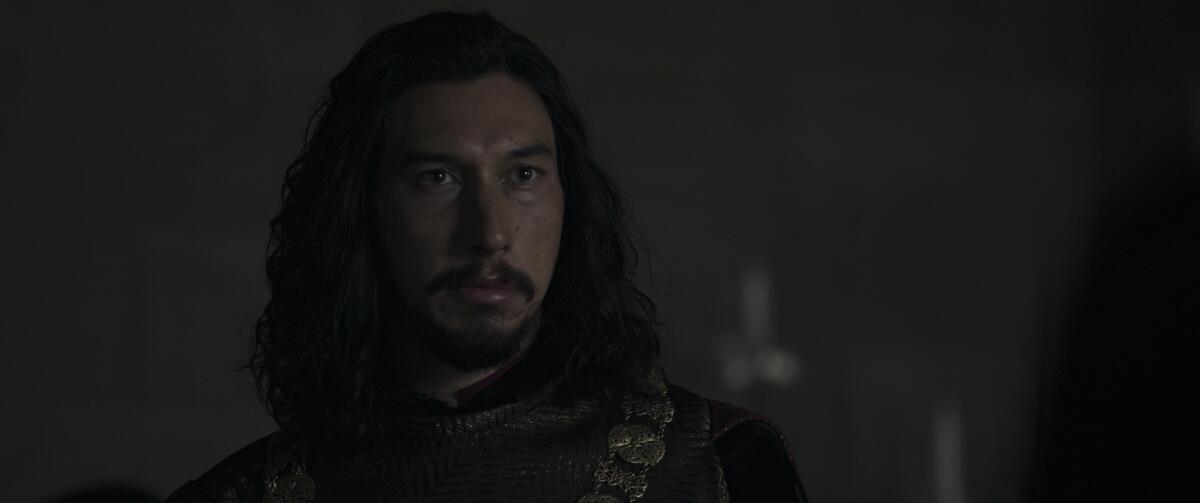
But if the scene feels repetitive, it isnât exploitative, and Holofcener wisely perceives Marguerite as more than the sum of her traumas. She may be trapped in a dull marriage that pressures her to produce a son (Carrougesâ heir problem is almost as bad as his hair problem) and stuck in a world where everyone, including her own mother-in-law (an acerbic Harriet Walter), regards her as chattel. But under these adverse circumstances, Marguerite distinguishes herself as a natural-born leader (she runs her husbandâs business better than he does) and, ultimately, the rare woman willing to speak out against a rapist and the age-old patriarchy that enables him.
Through Comerâs intelligent, fiercely empathetic performance, Marguerite becomes the movieâs conscience, one who forges a direct link between the injustices of the past and those of the present. When Marguerite finds herself on trial, forced to defend her rape allegation in a court full of proto-mansplainers, the #MeToo subtext all but ceases to be subtext. âThe Last Duelâ may superficially mimic âRashomon,â but in these moments it arrives at a decidedly different conclusion from Akira Kurosawaâs classic. Truth isnât always ambiguous; sometimes itâs just suppressed, ignored and written out of history.
All of which runs the risk of making this movie sound obvious in its indictment of the arrogance, stupidity and awfulness of men in every century. Tell us something we donât know! But if âThe Last Duelâ hits some familiar notes, it hits them, more often than not, with both unfeigned anger and an invigoratingly dark sense of humor. Thereâs a savage, self-flagellating gusto in the performances of Driver and especially Damon, a willingness to seem truly loathsome in ways that the sheen of movie stardom doesnât always allow.
That subversiveness extends to the (anti)climactic duel itself, which Scott stages with all the bloody virtuosity youâd expect, but which nonetheless rings curiously, almost deliberately hollow. It hardly matters which man wins, the movie seems to be saying, in a world where women are destined to lose.
âThe Last Duelâ
Rated: R, for strong violence including sexual assault, sexual content, some graphic nudity and language
Running time: 2 hours, 33 minutes
Playing: Starts Oct. 15 in general release
More to Read
Only good movies
Get the Indie Focus newsletter, Mark Olsen's weekly guide to the world of cinema.
You may occasionally receive promotional content from the Los Angeles Times.
